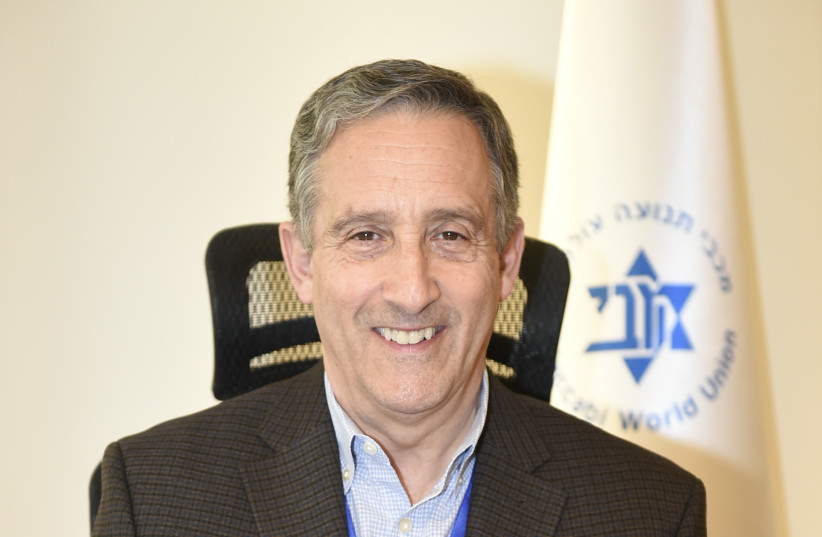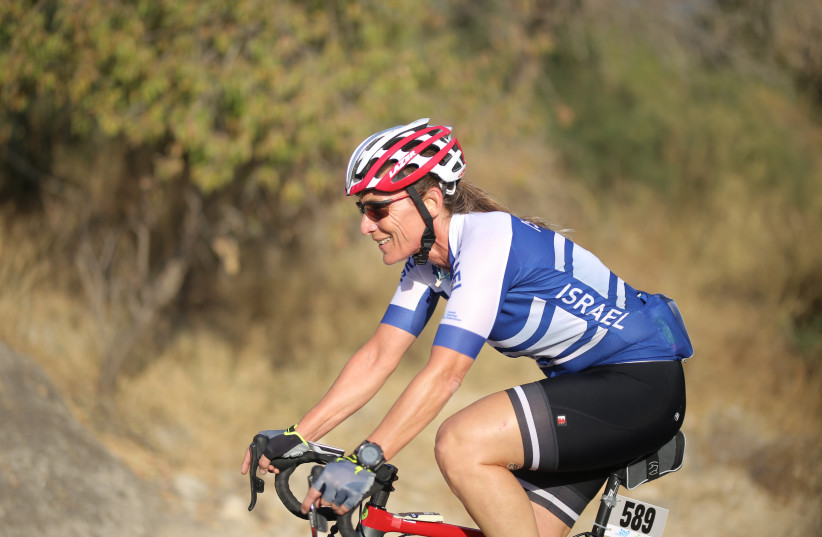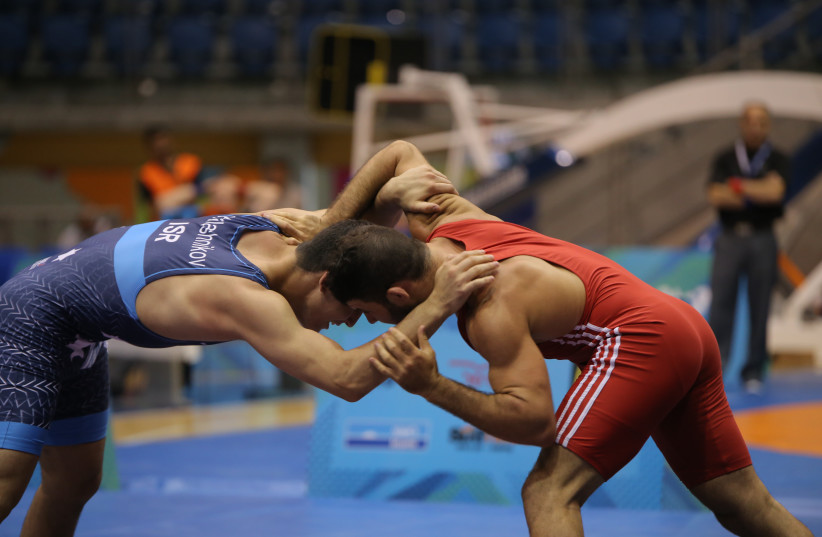Jordan Weinstein, vice president of Maccabi World Union (MWU), has quite a job on his hands.
“To give you an appreciation of what we do, in terms of the sports at the Maccabiah, it’s more compressed and challenging than the Olympics. They have three weeks and fewer teams,” he proudly states when we meet at Kfar Maccabiah, a sprawling campus of around 8 hectares which takes in a hotel, conference center and sports club, located near the Safari Park in Ramat Gan.
Weinstein was over here from the US to attend a congress in the lead-up to the 21st Maccabiah Games, scheduled for this July.
While I knew the Maccabiah was a major sporting event, involving numerous athletes from all over the globe, I had no idea it was such a gargantuan undertaking.
Weinstein rolls out some of the impressive numbers. “We have about 20 teams in the Men’s Open. Then we have teams in the 17-18 age group. We have competitions for 15-16[-year-olds]. We have the Women’s Open, we have 15-16- and 17-18[-year-old groups for women] and multiple master’s categories – over 35, over 45, over 55.”

That adds up. “There are more than 200 games that must be logistically handled, with referees, buses, pitches, etc., with eight competition days. It is amazing. And we pull that off every four years,” he chuckles.
Indeed they do, and have been doing that – Nazi regimes, colonial dictates and world wars permitting – since the curtain-raiser back in pre-state Palestine in 1932. The event was initiated by Yosef Yekutieli, who was inspired by the 1912 Olympic Games in Stockholm. Naturally, Yekutieli had to get the thumbs-up from the British Mandatory authorities that ran matters in these parts at the time. Approval was forthcoming, on condition that local Arab athletes and sportsmen from the British forces in Palestine were also admitted.
That condition was met, and the first Maccabiah duly opened at the newly built Ramat Gan Stadium on March 28, 1932. A complement of 390 athletes from 27 countries took part, across 16 sports. This time round there will be 10,000 athletes from 80 countries, competing in 47 areas of athletic expertise.
The games were planned, in the spirit of the Olympics, as a quadrennial event, although the sophomore outing took place in 1935, only three years after the inaugural games, with more than triple the debut participant complement. But that was that for a full 15 years. The third games, scheduled for 1938, were nixed by the British authorities because they feared they would serve as a ruse for bypassing the Mandatory immigration controls, and with good reason. The first two events had, indeed, been exploited for just such ends, with many of the Jewish sportsmen and women staying on in Palestine after the games were over, thereby circumnavigating the need to obtain an immigration certificate.
With such political shenanigans well and truly consigned to the history books, following the creation of the State of Israel in 1948, for the past 70-plus years the Maccabiah Games have grown from strength to strength. Today, in terms of the number of competitors, the Maccabiah is the world’s third largest sporting event, numerically inferior only to the Olympics and the soccer World Cup.
THAT IS undoubtedly a feather in the cap of everyone connected to the MWU. But spreading one’s wings generally entails dealing with new challenges, particularly in this day and age.
“The pandemic is not unique to Maccabi, but it has postponed everything,” says Weinstein. “We usually have one congress in Israel every year. In a normal four-year cycle we deal with different issues at each congress.”
With international travel, on the whole, being well-nigh impossible for the past couple of years, the Maccabiah gathering Weinstein came here to attend was the first since May 2018. The last games were held in 2017, and the 21st rollout should have taken place last year. With three missed congress berths, Weinstein and his fellow delegates had plenty to get through.
“It is very condensed. There is a lot of work to do,” he notes. “We have to organize the third largest sporting event in the world, and this congress is the first and final meeting to prepare the coming games, which are in July.”
It is a definitive all hands to the pump situation, and, pressing schedule notwithstanding, Weinstein was confident all the burning issues on the congress agenda would be thoroughly examined, discussed and agreed upon.
“Believe it or not, despite the pandemic, because there is so much solidarity among the Jews in this organization, with each other and also with the State of Israel, this is going to be the biggest Maccabiah we have ever had in history, even though we are still in a pandemic,” he stresses.

That, Weinstein adds, offers sorely needed rewards for all concerned.
“The Maccabiah is a big economic tourist boom for Israel, because with every athlete usually come parents, grandparents and siblings,” he laughs.
Weinstein is talking from professional and personal experience in that department. Back in 1985 he was one of the movers and shakers behind the introduction of rugby to the Maccabiah Games, and was a member of the US team at that year’s event.
That came up in conversation recently when he was honored by Maccabi USA for over 25 years of national and international leadership.
“I think my mother and my grandmother came to see me play in Israel,” he recalls.
That is small familial fry, he notes, compared with the younger participants. “If it’s a junior athlete, they bring the whole family. So you’re talking about a lot of people. You multiply each person [athlete] by five or six, so the numbers get up there.”
The Israel Hotel Association honchos must be rubbing their hands in gleeful anticipation, as the first post-COVID-19 summer promises to be a good one, thanks largely to Weinstein and his Maccabiah cohorts.
“The whole country gains from this,” he says.
By now it had become clear that the “Jewish Olympics” are more than just a large-scale sporting occasion.
“It serves multiple purposes,” Weinstein explains. “On the superficial level, we are trying to attract the best Jewish athletes in the world to have an Olympic-style competition. We make an effort to seek out and persuade the best athletes in the world to come.”
The evidence, he says, is there to be relished. “We have had world champions, Olympic athletes and gold medalists.”

“It is also a Zionist event, and it is also an event whose goal is Jewish continuity.” That, says Weinstein, is a pressing dome scratcher. “In the Diaspora, especially in North America, but in the Diaspora generally, assimilation is an issue. It is not only intermarriage. Polling shows, among younger generations, that Israel is not one of the top issues on their list of issues that they are interested and concerned with. We are failing, as a world Jewish community, in keeping Zionism and Jewish connectivity alive.
“We have been told by many experts, both secular as well as rabbis, that you can teach in a classroom about being Jewish and Israel, but doing something like this – combining their passion for sports with connecting with Jews from all over the world; and on top of that is the connection to the State of Israel – [can be an effective tool].”
Weinstein has been keenly aware of the problem for some time. “Before I became involved internationally I was involved in the leadership of Maccabi USA. I came up with the tagline that, at the time, seemed to be accurate. It went: We bring Jewish Americans to Israel and we hope to return with American Jews. Another one is: Sports is the attraction, Israel is the vehicle, Jewish continuity is the goal.” Succinct and to the ideological and practical point. “That sums it up,” he concludes.
That ethic courses through the whole organization.
“Maccabi is not just about sports,” Weinstein continues. “We have a big educational department, and we have people within the Maccabi World Union whose sole focus is to go around to these various Diaspora communities, to teach and educate, bring people to Israel. There are a lot of Maccabi programs where youth, especially from South America, come to Israel every year on various types of trips – sometimes it’s for a week, sometimes it’s for a month, sometimes it’s for an entire year.
“There is also a young leadership group from Europe; there are about 55 of them here right now, and they are being given leadership training courses to go back to their Jewish communities and be leaders there.”
The organizational eye is clearly very much on the future.
There’s more where that came from, nearer to home. “We have regional Maccabi Games – a mini version of the Maccabiah with all the multiple purposes I just mentioned. There is the European Maccabi Games, which happens every four years, two years after the Maccabiah.”
The idea is very much on spreading the word as far and wide as possible, and offering young Jews from different parts of the continent a firsthand taste of Jewish interaction, and meeting some of their coreligionists from other social and cultural milieus.
The European version takes place in a different city each time, and there are the Pan-American games in South America. Word is getting out. “As these games have grown, now countries outside those regions send in teams. For example, you don’t have to be from South America to go to the Pan-Am Maccabi Games. Australia sends a team. Israel sends a team. Canada, the United States, South Africa all send teams.”
Once again, Weinstein notes, there are broader and richer benefits to be gleaned from the Maccabiah. “It has grown, and it serves many purposes. It introduces the people who play to what we do. Then they all want to come to the Maccabiah. It helps those communities, the whole city; they have to galvanize the entire Jewish community to hold the event. Then, suddenly, they are emotionally invested in what we do. That’s how we keep growing.”
That, says Weinstein, means nothing short of keeping the global Jewish community alive and kicking.
“It [the Maccabiah] raises awareness, it raises passion, but most importantly, above everything else that I say, the key is Jewish continuity – connecting the Jews with each other to make them feel that they are not so alone in the world. We know that antisemitism is growing, and it can be a lonely place for a Jew.”
Weinstein is upbeat about this summer’s Games, and says he and the Games have been through some tough times over the years.
One of those occurred in 2001 when the Second Intifada was raging. Understandably, not too many American athletes were keen to come over here. “Buses were being blown up, and discotheques and bars were blown up. Nobody wanted to come. The world Jewish community wanted to postpone the Maccabiah.”
The organization’s heads got together, with prime minister Shimon Peres also contributing to the discussions.
“We said, you know what? We’ll bring anyone who wants to come,” Weinstein recalls.
The US ended up with a diminished, but still sizable contingent of almost 400 athletes, and the games went ahead, terrorist attacks notwithstanding.
As far as Weinstein is concerned, it was a fundamental existential issue for the organization. “At each of these moments, like at that time, if we had decided to postpone the Maccabiah, who knows if Maccabi would have even continued?”
But continue it did, and the fruits of that dogged determination will be on display here this summer. “We are 100 years old now, so we are combining our centenary with the biggest Maccabiah ever, in the middle of a world pandemic. It says something about the work we do, and it’s actually paying dividends.”
Let the Games begin. ■
